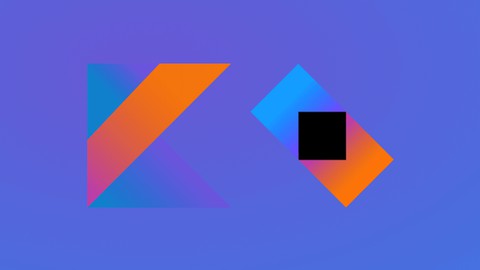
Kotlin Multiplatform Mobile with Ktor
Kotlin Multiplatform Mobile with Ktor, available at $44.99, has an average rating of 3.9, with 81 lectures, based on 114 reviews, and has 763 subscribers.
You will learn about Kotlin Ktor Koin KGraphQL KMongo Multiplatform Apollo This course is ideal for individuals who are Full stack developers looking to learn server-side Kotlin, Ktor and GraphQL or Full stack developers looking to learn Multiplatform mobile app development or Mobile developers interested in cross-platform app development with Kotlin It is particularly useful for Full stack developers looking to learn server-side Kotlin, Ktor and GraphQL or Full stack developers looking to learn Multiplatform mobile app development or Mobile developers interested in cross-platform app development with Kotlin.
Enroll now: Kotlin Multiplatform Mobile with Ktor
Summary
Title: Kotlin Multiplatform Mobile with Ktor
Price: $44.99
Average Rating: 3.9
Number of Lectures: 81
Number of Published Lectures: 81
Number of Curriculum Items: 81
Number of Published Curriculum Objects: 81
Original Price: $84.99
Quality Status: approved
Status: Live
What You Will Learn
- Kotlin
- Ktor
- Koin
- KGraphQL
- KMongo
- Multiplatform
- Apollo
Who Should Attend
- Full stack developers looking to learn server-side Kotlin, Ktor and GraphQL
- Full stack developers looking to learn Multiplatform mobile app development
- Mobile developers interested in cross-platform app development with Kotlin
Target Audiences
- Full stack developers looking to learn server-side Kotlin, Ktor and GraphQL
- Full stack developers looking to learn Multiplatform mobile app development
- Mobile developers interested in cross-platform app development with Kotlin
Welcome to the future of mobile app development.
Kotlin Multiplatform Mobile allows developers to save time by writing the business logic for their iOS and Android apps just once, in pure Kotlin. Kotlin compiles an embedded framework that is shared between iOS and Android apps. Developers can now write and reuse code that is shared across platforms.
In this course we create a GraphQL server and shared repository in pure Kotlin. The course code covers the Ktor GraphQL server, and client-side shared repository. The final chapter provides an overview of Jetpack Compose and SwiftUI.
What is KMM?
Kotlin Multiplatform, or KMM allows developers to create cross-platform mobile applications using shared business logic. Under the hood, Kotlin compiles a shared framework that is embedded with native iOS and Android applications.
KMM is designed to handle core business logic in Kotlin such as client-side networking, caching and persistence.
In short, KMM will handle any logic that does not involve displaying data. The benefit of this approach is that you can reuse code, save time, and still leverage the latest iOS and Android technologies.
Why KMM?
Pros
-
Native performance and flexibility, along with code reusability.
-
Platform-specific code that *just works*.
-
No restrictions on your app’s UI, so you can build with SwiftUI, Jetpack Compose, etc.
Cons
-
There is a learning curve if you have little to no experience with Kotlin.
-
Multiplatform projects are currently in alpha. Language features and tooling may change in future Kotlin versions.
Installation
In this course, we will be using two different IDEs:
-
IntelliJ IDEA
-
Android Studio Preview (Arctic Fox).
In order to develop iOS applications, you will need a computer running Mac OS and Xcode 12+. Xcode is not required for this course. The code we write is pure Kotlin, and you have the option to write Swift for the final project.
Ready? Let’s get started.
Course Curriculum
Chapter 1: Introduction
Lecture 1: Introduction
Lecture 2: Installation
Lecture 3: Hello World
Lecture 4: IntelliJ
Lecture 5: Dessert Model
Lecture 6: Database
Lecture 7: Repository Interface
Lecture 8: Dessert Repository
Lecture 9: Scope Functions
Lecture 10: Dessert Schema
Lecture 11: Dessert Query and Mutations
Lecture 12: Install Schema
Lecture 13: Code Lab: Update and Delete Dessert
Lecture 14: Code Lab Solution: Update and Delete Dessert
Chapter 2: Koin and KMongo
Lecture 1: Introduction
Lecture 2: Koin and KMongo
Lecture 3: Start Koin
Lecture 4: Repo Updates
Lecture 5: Dessert Repository
Lecture 6: Dessert Service – Part 1
Lecture 7: Dessert Service – Part 2
Lecture 8: Dessert Schema
Lecture 9: Application Test
Lecture 10: Paging Info
Lecture 11: Get Desserts Page
Lecture 12: Desserts Page Schema
Lecture 13: Test Desserts Page
Chapter 3: Reviews
Lecture 1: Review Model
Lecture 2: Review Repository
Lecture 3: Review Service – Part 1
Lecture 4: Review Service – Part 2
Lecture 5: Dessert Service Update
Lecture 6: Review Schema – Part 1
Lecture 7: Review Schema – Part 2
Lecture 8: Test Reviews
Chapter 4: Authentication
Lecture 1: Introduction
Lecture 2: User Model
Lecture 3: Profile Model
Lecture 4: User Repository
Lecture 5: Auth Service
Lecture 6: Sign In
Lecture 7: Sign Access Token
Lecture 8: Sign Up
Lecture 9: Verify Token
Lecture 10: Auth Schema
Lecture 11: Test Auth Service
Lecture 12: Profile Service
Lecture 13: Profile Schema
Lecture 14: Test Get Profile
Chapter 5: Deployment
Lecture 1: Procfile
Lecture 2: Shadow Jar
Lecture 3: Heroku Local
Lecture 4: Deployment
Chapter 6: Apollo Client and SQLDelight
Lecture 1: Introduction
Lecture 2: Initialize Repo
Lecture 3: Checkout Develop
Lecture 4: Apollo Provider
Lecture 5: Download Apollo Schema
Lecture 6: SQLDelight Tables
Lecture 7: Database Driver
Lecture 8: SQL Statements
Lecture 9: Database Desserts
Lecture 10: Database User State
Lecture 11: Apollo Provider Database
Lecture 12: Code Lab: Logging Interceptor
Chapter 7: KMM Repository
Lecture 1: Introduction
Lecture 2: Generate Queries
Lecture 3: Base Repository
Lecture 4: Dessert Query Mapper
Lecture 5: Dessert Mutation Mapper
Lecture 6: Review Mapper
Lecture 7: Dessert Repository Queries
Lecture 8: Dessert Repository Mutations
Lecture 9: Dessert Repository Database
Lecture 10: Auth Repository Mutations
Lecture 11: Auth Repository Queries and Database
Lecture 12: Code Lab: Review Repository
Lecture 13: Code Lab Solution: Review Repository
Lecture 14: Action Type
Chapter 8: SwiftUI and Jetpack Compose
Lecture 1: Introduction
Lecture 2: Architectural Patterns and Final Project
Instructors
-
Michael Stromer
Mobile Developer
Rating Distribution
- 1 stars: 8 votes
- 2 stars: 8 votes
- 3 stars: 29 votes
- 4 stars: 30 votes
- 5 stars: 39 votes
Frequently Asked Questions
How long do I have access to the course materials?
You can view and review the lecture materials indefinitely, like an on-demand channel.
Can I take my courses with me wherever I go?
Definitely! If you have an internet connection, courses on Udemy are available on any device at any time. If you don’t have an internet connection, some instructors also let their students download course lectures. That’s up to the instructor though, so make sure you get on their good side!
You may also like
- Best Video Editing Courses to Learn in February 2025
- Best Music Production Courses to Learn in February 2025
- Best Animation Courses to Learn in February 2025
- Best Digital Illustration Courses to Learn in February 2025
- Best Renewable Energy Courses to Learn in February 2025
- Best Sustainable Living Courses to Learn in February 2025
- Best Ethical AI Courses to Learn in February 2025
- Best Cybersecurity Fundamentals Courses to Learn in February 2025
- Best Smart Home Technology Courses to Learn in February 2025
- Best Holistic Health Courses to Learn in February 2025
- Best Nutrition And Diet Planning Courses to Learn in February 2025
- Best Yoga Instruction Courses to Learn in February 2025
- Best Stress Management Courses to Learn in February 2025
- Best Mindfulness Meditation Courses to Learn in February 2025
- Best Life Coaching Courses to Learn in February 2025
- Best Career Development Courses to Learn in February 2025
- Best Relationship Building Courses to Learn in February 2025
- Best Parenting Skills Courses to Learn in February 2025
- Best Home Improvement Courses to Learn in February 2025
- Best Gardening Courses to Learn in February 2025






















